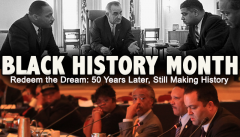
Each year during February we celebrate the incredible journey of African American life and culture in America with Black History Month. This year, the history of the Civil Rights movement looms especially large as we recognize a number of significant milestone anniversaries.
Although the struggle for racial equality in the United States reaches back centuries, the watershed moment is the signing of the Emancipation Proclamation, 150 years ago. Although it freed many - but not every - slave in bondage in America, just as significantly it changed the focus of the war from preserving the Union to ending slavery. In many ways it established one of the moral principles for which we stand as a nation.
One hundred years later, more than a quarter million Americans gathered at the Memorial honoring the Great Emancipator to continue the fight. The March for Jobs and Freedom in 1963 was organized by A. Philip Randolph of the Brotherhood of Sleeping Car Porters with help from the National Urban League’s Whitney M. Young Jr., James Farmer of the Congress of Racial Equality, John Lewis of the Southern Non-Violent Coordinating Committee, and Roy Wilkins of the NAACP. While the March is best remembered for Dr. King's powerful "I Have A Dream" speech, its lasting legacy is passage of the Civil Rights Act the following year and the Voting Rights Act in 1965.
Now, fifty years later, we are still fighting to preserve African-American economic opportunity and help all Americans 'Redeem the Dream'. Despite the historic gains of the Civil Rights movement, black unemployment remains double the rate of white Americans, and African Americans are still struggling to overcome the heavy financial setbacks of the Great Recession. We have begun convening with America's leading civil rights, social justice, business, labor, faith and community leaders to confront these issues and this year, the National Urban League has launched a five-year, $70 million initiative called Jobs Rebuild America designed to employ, educate and empower communities that have been hardest hit by the economic crisis.
As we look back on 150 years of struggle and sacrifice, and especially when we look back at the enormous progress since the 1963 March on Washington, we realize our responsibility to make sure every American has an opportunity to achieve the American dream.










